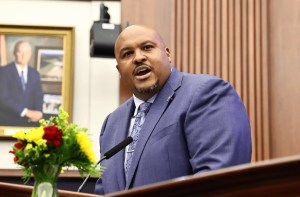 A provision that made Florida a national literacy leader 20 years ago could be repealed in an effort to ease the regulatory burden on Florida’s school districts.
A provision that made Florida a national literacy leader 20 years ago could be repealed in an effort to ease the regulatory burden on Florida’s school districts.
A state Senate panel unveiled a package of proposed deregulation legislation. One proposal would end the requirement that public schools hold back third graders who struggle in reading.
House Bill 1, passed earlier this year, created the largest expansion of education choice in the nation’s history.
The legislation also launched a new deregulation effort, championed by Senate President Kathleen Passidomo, designed to create a more level playing field for school districts. The Senate Education Committee this week reviewed survey responses from more than 2,000 people, most of them parents.
Right now, public schools are required to hold back third graders who score below Level 2 on state reading assessments. Students can still move on to fourth grade if they pass an alternative test, present a portfolio of work, or meet specific exemptions.
The Senate proposal would eliminate those provisions and require school districts to provide “specific supports” for students in kindergarten through third grade who are retained because of a reading deficiency.
Other proposals would overhaul the A-F grading formula, ease the state-mandated turnaround timeline for low-performing public schools, and eliminate must-pass math and English exams for 10th graders.

Sen. Corey Simon, R-Tallahassee, and two other senators overseeing the deregulation project did not comment on the proposed legislation, which was outlined at a Senate K-12 Education Committee workshop this week, as well as a separate list of recommendations from the Florida Department of Education that did not include eliminating the retention requirement or other major shakeups of the state accountability system.
Adam Miller, a senior chancellor at the Florida Department of Education, said learning to read well by third grade is critical to success in future grades.
“If we are pushing kids into fourth grade, not only are they struggling in social studies, they struggling in science, and they’re struggling in math, and we’re just putting them on a bad path forward,” Miller told members of the House Education Quality Subcommittee while presenting the department’s recommendations.
A key part of then-Gov. Jeb Bush’s education reform policies, third-grade retention sparked plenty of controversy, with critics saying it would harm children socially and emotionally.
Since it was enacted, Florida’s national reading scores have improved, and about half the nation’s states have adopted similar policies.
As Bush remarked in 2018, “It’s absolutely insidious to suggest that a functionally illiterate kid going from third grade, it’s OK to go to fourth. Really?”
During 2003-04, the initial year of the policy, the state retained 14% of third graders. Six years later, that number dropped 6% as more students met the standard. Martin West, a Harvard Graduate School of Education professor, and other researchers followed 75,000 Florida students who were held back under the law and compared them with students who were near the cutoff score and were promoted as well as classmates now in the same grade as those who were retained. The study showed higher test scores in high school and students taking fewer remedial courses, with no effect on their probability of graduating from high school.
While research on retention policies has shown that middle school retention can raise high school dropout rates, holding younger students back while providing support such as summer school and personalized literacy plans can help them make academic progress.
The proposals from the Florida Department of Education and all three senators will be included in bills to be discussed during the committee’s next meeting on Nov. 15.
Former state Sent. Bill Montford, who is also chief executive officer of the Florida Association of District School Superintendents, praised the deregulation efforts as “music to the ears’ of those who work in district schools.
“Now is the time to make those bold and sometimes controversial decisions that will ensure a level playing field for all choices that parents and students will have,” Montford told the committee “Our traditional neighborhood schools have proven for generations to be highly successful, and the preferred choice of most families, and your efforts can make traditional schools an even better choice for our parents and our students.”


